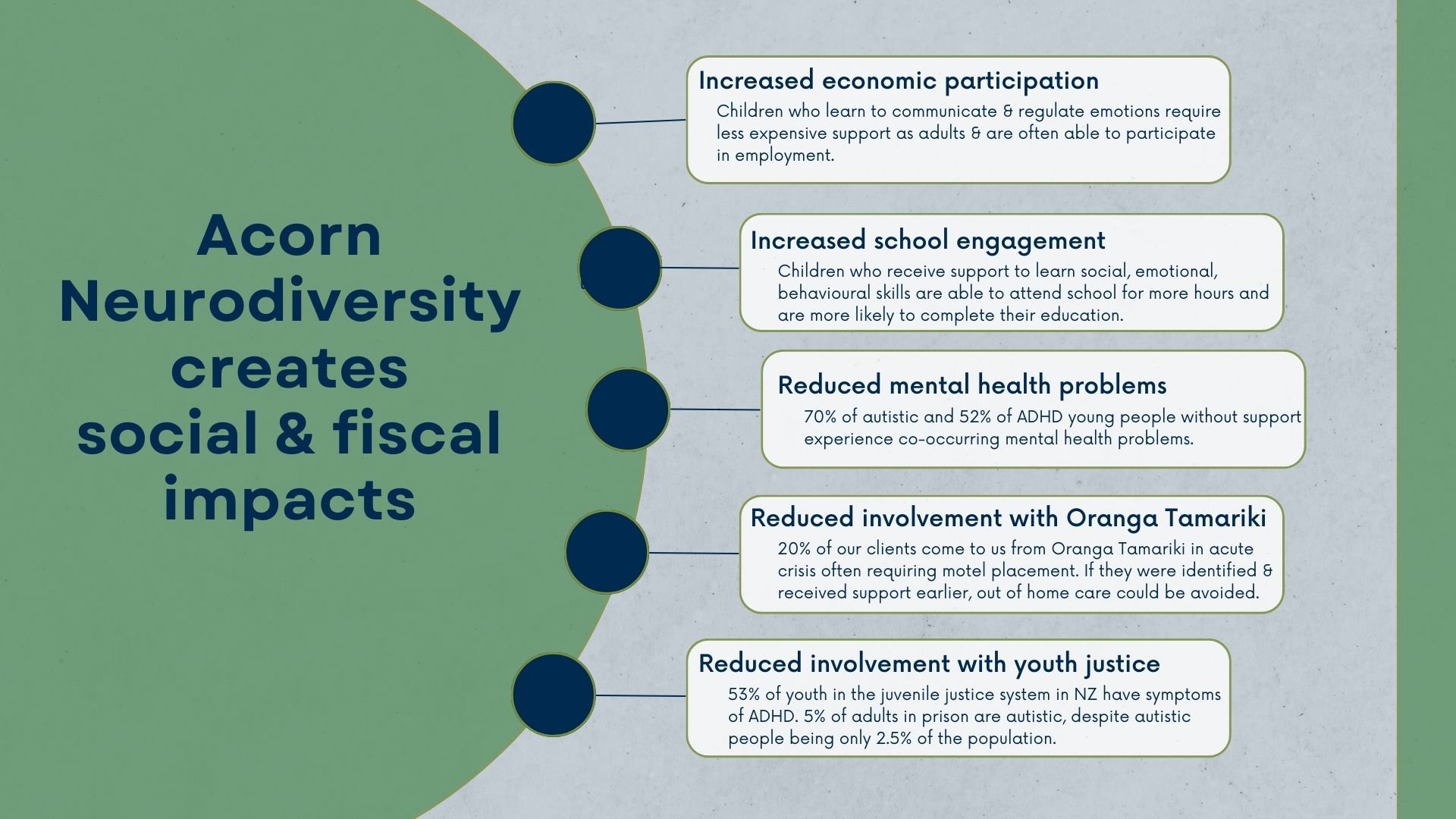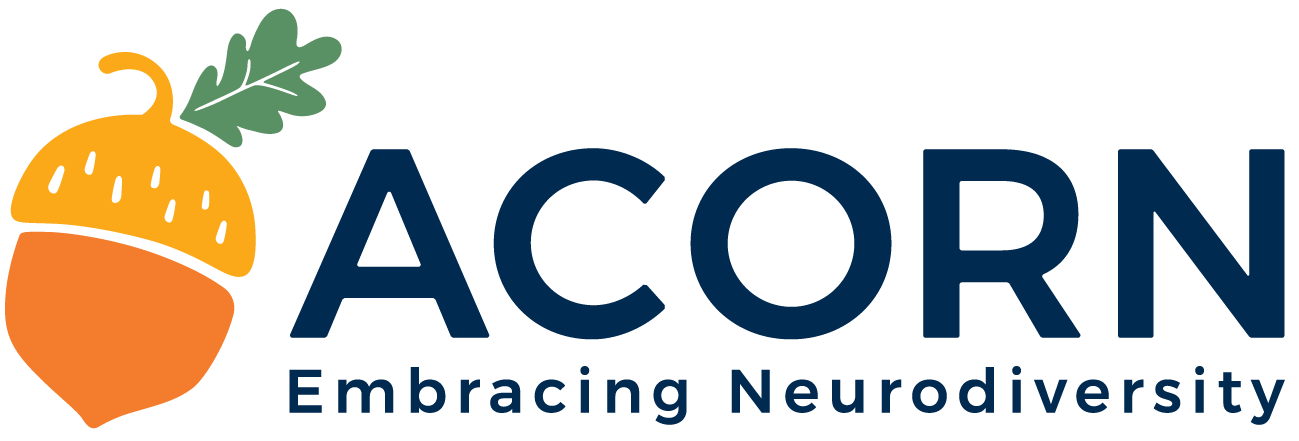
Our Impact

The Problem: By the Numbers
Who do we serve
Acorn serves children ages 2- 22 and their whānau. No diagnosis is required.
Our data shows that the majority of our families come to us for learning needs related to communication, self-help skills and challenging behaviour. Many of them have complex needs including autism, ADHD, dyslexia, epilepsy, intellectual disability and dyspraxia.
How we create change
No Mind Left Behind
From our stakeholders
ON NEURODIVERSE-AFFIRMING
“Acorn are also teaching us that we don’t want to train everything out, some of it is a superpower”
“[It’s amazing] the mana-enhancing way he works with him”
“He has so much more acceptance [of who he is], he’s really proud. He’s a lot more confident and happy”
“Acorn was able to role model how other children can support him…he became quite a celebrity. It gave us skills and courage to show what he can do……it was the end of year Christmas concert and the children had been rehearsing. He would run in between them, stand there spinning around…changed the whole dynamics…parents were coming up to us saying how amazing and inclusive it was…he was also able to participate in the Colour Run…we have so many stories like these thanks to Acorn’s support”
— school principal
ON A SUPPORT NETWORK FOR EVERY FAMILY
“We know we can email them at any time, when we’re struggling, when we need help. That was great for us, knowing we have that fall back because as parents…you want to have autonomy. The team were good at helping when you want it, going at our pace, and how we wanted.”
“Acorn are great because they guide us too, they’ll ask us what are the challenges…it’s all very individualised.”
“I actually felt supported, if I came to a point where I was struggling with a behaviour, [Acorn] would actually listen…and always come back with a range of options. I could have my good days and my bad days, and there was never judgement, just such positive affirmations.”
ON MULTI-DISCIPLINARY, COORDINATED CARE
“Rather than having three different therapists, [our child] was able to build a strong relationship with one person. He doesn’t like changes, so this was huge for him - the consistency and relationship”
”We could benefit from the wrap around of three services in one without having to find all of them”
ON HOPE
“We don’t worry so much”
“It’s very scary those first few months. Once we were there [with Acorn] we could understand where he was going…a huge shift in perception from 4 years ago to now”
“As parents we get to see our children be the best they can be”
“He’s just a miracle really, he’s talking, almost conversational, just gone off to school, they can largely understand him”
“[Without Acorn’s support] I wouldn’t have been able to go back to work in the way that I have.”
“[We can be] a bit more “normal”, we can get out and do things other families can do because we know how to manage the situation a lot better”
“He’s still autistic and always will be…but he has a lot more confidence…he’s very happy”
“His relationships have changed…working with the team has helped him hugely…some of the tips they gave us we could implement at home. Now he has some friends”


Benefit to Community
The services that Acorn provides impact the entire community by increasing equity and social inclusion. When neurodiverse, autistic, or ADHD children are supported to participate in schools and communities, the entire community becomes more inclusive and tolerant of differences. As we support children in their schools and early childhood centres and provide free professional development to schools and ECEs, more teachers and community members learn about neurodiversity and autism which creates a more accepting and diverse community.
We collaborate with community stakeholders such as Oranga Tāmariki, Disability Connect, the Ministry of Social Development and the Ministry of Education. When we work closely with other community organisations, we are able to have a much greater impact as our specialist knowledge is shared with the wider child-serving community.
International research demonstrates the benefits of intensive early intervention.
Services for young children who have developmental disabilities have been shown to positively impact outcomes across developmental domains, including health, language and communication, cognitive development and social/emotional development. High-quality early intervention services can change a child’s developmental trajectory and improve outcomes for children, whānau and communities. Intervention is likely to be more effective and less costly when it is provided earlier in life, rather than later.
Families benefit from early intervention by being better able to meet their children’s special needs from an early age and throughout their lives. Benefits to society include a reduced economic burden through a decreased need for special education, the justice system and other support, and happier, more resilient families who contribute to their communities.

Fiscal impact of intensive early intervention:
The cost of ongoing support for children who had received developmental behavioural therapy decreased by US$19,000 (approximately NZ$31,000) per child per year because of a reduced need for other support services.
Another programme of early support in the Netherlands was associated with an estimated cost saving of €1,103,067 (approximately NZ$1,912,387) across an individual’s lifetime due to reduced ongoing costs associated with education and supported work/living.
A collaboration between The Autism Research Advisory Group of Australia and Synergies Economic Consulting group in 2013 found that $100,000 spent per child on early intervention netted $1,221,300 government savings over the lifespan of that child.



